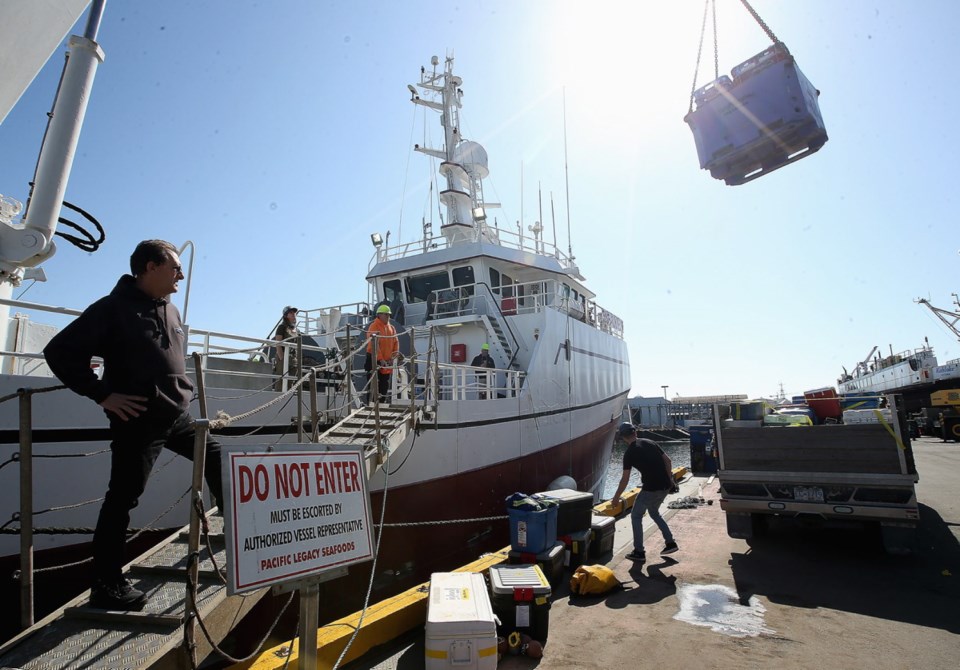When the Pacific Legacy No. 1 trawler returned to Victoria Harbour on Tuesday, it arrived with precious cargo that had to be preserved in particular conditions.
Tiny samples of DNA from salmon caught near the southern boundary of the Gulf of Alaska and off B.C. were stored at - 80 C. They were packed in dry ice and are being taken up to the federal Pacific Biological Station in Nanaimo for later analysis.
Samples are small in size, but hold critical information that international scientists are keen to examine. The DNA will reveal exactly where the fish originated, adding to a body of knowledge about what factors affect Pacific salmon survival in open ocean, where they spend most of their lives.
This month and last, an international team of scientists went out to sea for the second year in a row to catch the five species of Pacific salmon. This year, they returned with about 600 fish.
Scientists from the University of B.C. who took part in the expedition will be returning to Vancouver with other samples for further examination in laboratories.
Scientists Richard Beamish and Brian Riddell privately raised $1.45 million to fund this year’s endeavour. They received funds from the B.C. and federal governments, the private sector, non-profit groups and individuals. The pair also raised more than $1 million for the previous expedition, which fished farther north in the Gulf of Alaska.
This year’s survey was carried out in a more southerly area because of poor weather in the north and because U.S. scientists who had been on board left in Prince Rupert because of concerns that the pandemic would lead to closed borders. Legally, the three Americans were required to be on board if the Pacific Legacy was to fish in U.S. waters, which it was subsequently unable to do.
Questions driving the expedition are of interest to Pacific salmon-producing countries — Russia, Japan, Korea, the U.S. and Canada — which are seeing significant differences in returns of their stocks. Some are experiencing high numbers of certain species while others, such as Canada, are anticipating another poor season this year. Last year’s return of Fraser River sockeye was the lowest on record.
The Pacific Legacy left Victoria on March 11, heading north, where the team of Russian, Canadian and American scientists pulled in strong catches. After leaving Prince Rupert and heading south again, with three Russian and six Canadian scientists on board, the fishing effort was skunked for several days.
However, more salmon were caught about 800 kilometres off the west coast of Vancouver Island in recent days. On Monday, about two dozen chinook salmon were pulled in. Some were hatchery fish, possibly from the U.S., but their origins will require lab analysis, Beamish said. “We would not have expected a large catch of just chinook salmon.”
Chinook have been the subject of strict fishing regulations because of low stock numbers and because they are the favoured food of endangered southern resident killer whales.
“There is one thing that is crystal clear — that is that both of these expeditions provide ample evidence that we need to understand the bigger picture of what regulates salmon abundance,” Beamish said.
“That bigger picture is the time that they are spending in the ocean outside of the coastal area and we really know very little about it.”
These kinds of expeditions are difficult to mount because they are expensive and require about four weeks on the water, Beamish said.
Now that the team is back on shore, the Russians are going to Nanaimo, where they will be staying in a home of one of the Canadian representatives on the cruise. They are unable to return home until the end of the month.
They will not be idle, though. The three will be writing the cruise report, a detailed document, which will be sent to all the funders, Beamish said. Participating countries are all sharing their data.



